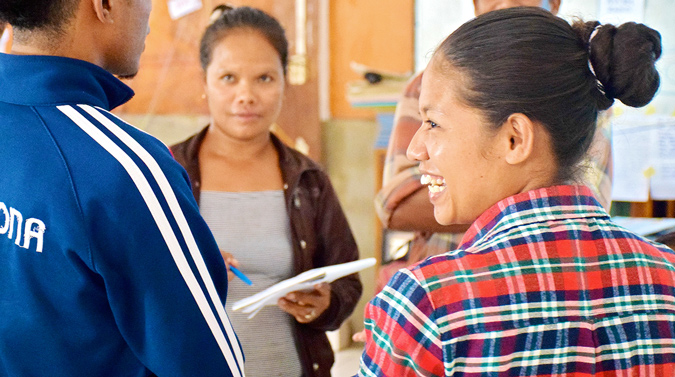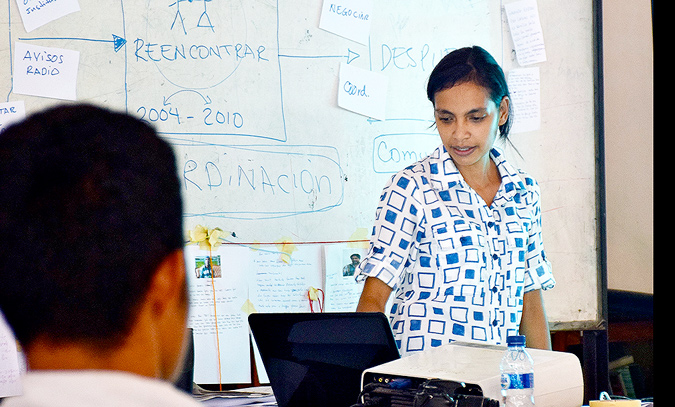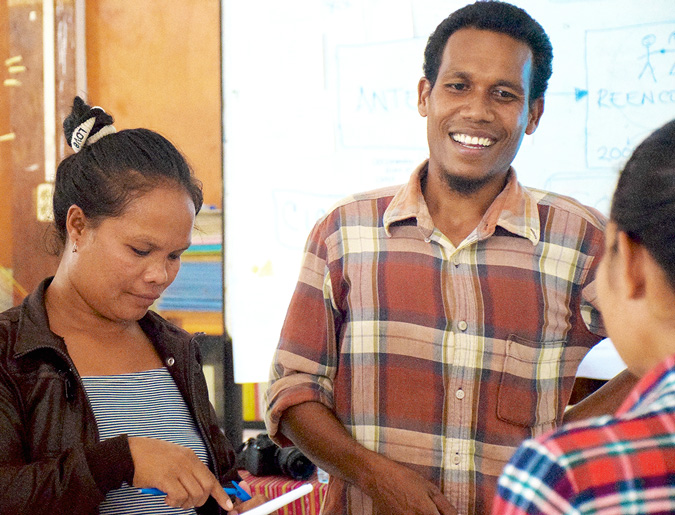Preparing Journalists to Promote Change: Training on Gender Sensitive Reporting in Timor-Leste
Date:
Author: Christina Yiannakis
Information and Communication Technology (ICT) are some of the most powerful tools available to us for sharing ideas and messages of change. Using the right technology, with the right message, at the right time can influence the behavior of those around us, changing our lives for the best and making ICT vital in the global struggle for gender equality.

Despite a long history of political unrest, as well as geographic challenges as a result of its lush, mountainous landscape, access to ICT in Timor-Leste is rapidly increasing. Statistics collected in 2010 indicate that despite the fact that less than one in ten people (7%) have access to the internet each week, nearly half of the population has weekly access to television (48%), one in five (21%) can access newspapers, and radio listenership is ever increasing with approximately 36% of Timorese women, and 44% of Timorese men choosing to tune in to radio shows each week.
Stepping up to deploy the power of ICT and radio for positive change across the nation, Search for Common Ground Timor-Leste (SFCG) and the Association of Men Against Violence, with the support of UN Women and contributions from the European Union and the Government of Norway, are working with community members and local radio journalists to raise awareness of issues of gender inequality. Harnessing the power of radio stories and dramas can help shift tolerance for the widespread violence that has affected an estimated 38% of Timorese women who have faced physical violence in their adult lives. More than information sharing, the radio programmes and engagement with listeners will amplify the voices of community members to highlight in their own words the reality of women’s human rights locally, and opens space to discuss how changes in community attitudes could help end discrimination.

This week, SFCG embarked upon one of the most important, and most challenging steps towards producing a successful awareness raising programme; a workshop dedicated to teaching 20 radio journalists from across the nation how to report on gender in an ethical and effective manner. “The training is run from a gender perspective, using this as the focus when talking about sensitive journalism,” explains trainer and journalist Zevonia Vieira. “I am working hard to make sure the attendees understand that if they want to cover gender issues, they need to be able to analyse the issues using simple language and ideas for the listener, and to protect the women listening and the women being interviewed, while promoting equality,” Vieira clarifies.
Having independently produced 15 women’s empowerment themed radio programmes, Vieira’s knowledge of sensitive journalism in Timor-Leste is extensive. “When we speak to women and men in the community about gender, and then broadcast it on the radio we, as media personnel, need to make sure we are contributing to the peace, with a true interest in promoting women,” Vieira comments. One of the growing number of gender and media advocates in the Asia Pacific region, Vieira was selected to participate in the regional training on Reporting for the Beijing +20, Youth Engagement and Gender Responsive Advocacy for Media in the Asia Pacific. With support from UN Women and UNFPA, 22 journalists from the region learned how to use international frameworks on gender to guide their reporting, focusing specifically the Beijing Platform for Action which calls for media to take a greater role in promoting gender equality. Using her understanding of the international policy, Vieira has been able to guide journalists on how to create their own reports that are gender-sensitive and can foster this change.

“This training has been incredibly important to us as journalists,” commented Felipe da Costa of Radio Jojo in the capital Dili. “We have been learning and practicing skills that we had yet to master.” Following the training, each radio journalist will return to their work to conduct interviews with community members, including women who are running as leaders in the suco (village) elections to be held in December. Acknowledging the media potential role to positively influence society, da Costa reflected, “Our most important lesson to take back with us is how we, as journalists, can help to contribute to peace and tranquility within our communities.”